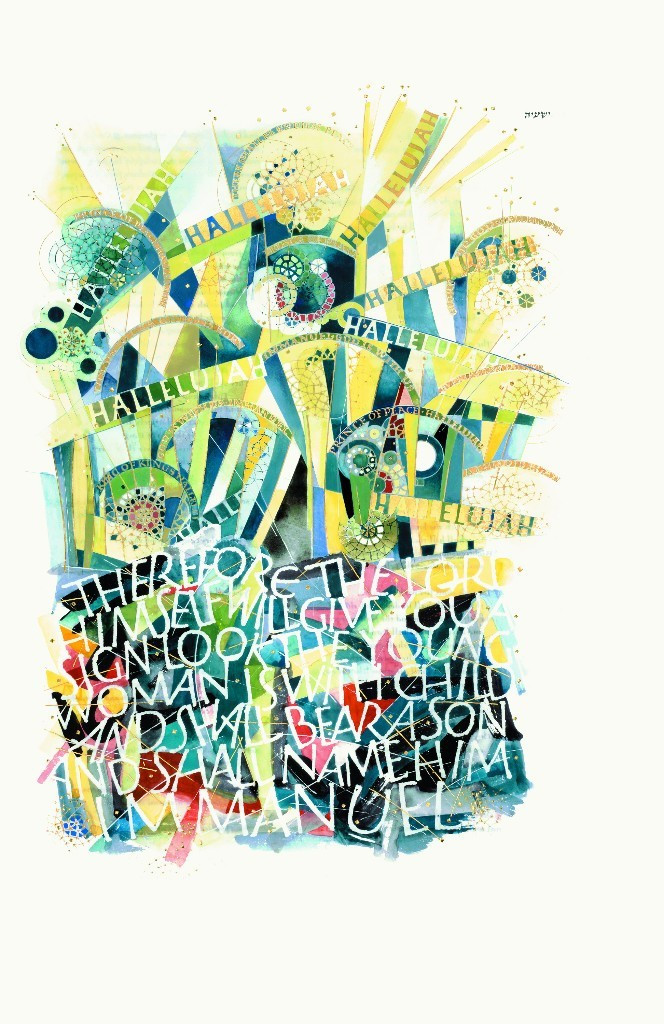The Advent Project: Week 3預覽

Dec. 18: The Solomonic Prince of Peace

Messianic Predictions, Thomas Ingmire. Handwritten with quills on calfskin vellum, with gold and platinum leaf, and hand-ground pigments. © 2005 The Saint John’s Bible, Saint John’s University, Collegeville, Minnesota, USA. Scripture quotations are from the New Revised Standard Version of the Bible, Catholic Edition, © 1993, 1989 National Council of the Churches of Christ in the United States of America. Used by permission.
“O Holy Night” from the album Libera: The Christmas Album. Performed by Libera. Lyrics: Placide Cappeau, Music: Adolphe Adamand.
Poetry:
“Daytime”
by Komal Mathew
A good shepherd is a wonder incontrapposto, an artist
mapping the Serengeti with kingdom lines.
A good shepherd angles a lion’s eye, traps gazelles
in dry fields, copies a cheetah’s spots one leg at a time.
A good shepherd does not give you stones
when you ask for toast, does not ask you to work
without a burning bush—but owns a gate, uses a gate, pulls
the weeds and leaves the wheat on an altar of choices.
A good shepherd is a prince of peace when terror finds its full echo,
a creator in the wild where a predator, providentially, becomes prey.
THE SOLOMONIC PRINCE OF PEACE
The story of Christmas is a story full of contrast and contradictions. The story of the Gospel is a story of God acting against our preconceptions of how God should act. But, if we’re paying attention to who God is, maybe we shouldn’t be too surprised after all.
I’ve grown up singing carols and hymns every Christmas. Maybe you have, too. Every year, the bustle of the “holiday season”—and, if I’m being honest, the exhaustion of bringing another year to an end—tempt me to pass by the surprise of Christmas. The songs I sing are too familiar to feel wonder-full. And the busyness of the season is more frenetic than fantastic. Sure, the weary rejoice—but just barely.
Yet ever so often, maybe not every year, or maybe for just one moment during Advent, I catch a glimpse of what we say we celebrate––that the God who crafted the universe became Immanuel, God with us. There, I feel the warm polyphony of that first hallelujah chorus bursting in my chest. It’s as if “He appeared, and the soul felt its worth.”
The Scripture chosen for today’s devotion begins with a reflection on King David and his successor son, Solomon. The Lord tells David that his life of violence placed limits on his legacy (1 Chronicles 22:7–8, NKJV)
Because of the destructive power of war, the father’s dreams must be delayed and carried out by the son. David built an empire through war; that’s how empires are built. But building God’s house is a different task altogether.
We’re told Solomon was a man of peace, a man at rest from war (1 Chronicles 22:9). It’s from this place of peace that Solomon is allowed to build God’s house. In Matthew 12, Jesus—the Prince of Peace—situates himself as one greater than Solomon. The house that Jesus prepares, the Kingdom that he brings, is not built through violence, either.
There are some creative tasks that only peace can perform. War and violence have their end. As Martin Luther King, Jr. once quipped, “Darkness cannot drive out darkness: only Light can do that.” In the darkness of that first Christmas night, Immanuel arrives to bring God’s light.
It’s fitting, I think, that in Thomas Ingmire’s illumination, Messianic Predictions, “Immanuel” is not written among the hallelujah chorus in the sky but firmly fixed on the ground. One might expect God to burst on the scene when the heavens unfurl and angelic trumpets blare, like a triumphant empire-building king. But the surprise of Christmas is that Immanuel arrives like a son—infant and vulnerable. Not in a city of imperial power––Rome or even Jerusalem––but in that little town of Bethlehem. God’s way is not the way of the world. Yet, this is a truth told in the earliest pages of Scripture. This is who God is.
Weary world, rejoice! When terror shouts to find its full echo, when the exhaustion of this year mounts, may you remember and experience the Good Shepherd—the Prince of Peace—acting creatively in your life and in our world this Advent season. And may you discover anew his eternal law of love and abiding gospel of peace.
Prayer:
Immanuel, thank you for choosing to be with us. I confess I’m coming to Christmas a little wearier this year, and I’m tempted to forget what I say I believe. Forgive me for being distracted, by the busyness of my life or the terrors of this world, and forgetting just how good, and creative, you are. Prince of Peace, drive out the darkness in my life and in this world with your light. And may I learn to live in your way of light, too.
In Jesus’s name, Amen.
Chase Andre, M.A.
Instructor in Communication Core and Digital Learning
Department of Communication Studies
Biola University
For more information about the artwork, music, and poetry selected for this day, please visit our website via the link in our bio.
關於此計劃

Biola University's Center for Christianity, Culture & the Arts is pleased to share the annual Advent Project, a daily devotional series celebrating the beauty and meaning of the Advent season through art, music, poetry, prayer, Scripture, and written devotions. The project starts on the first day of Advent and continues through Epiphany. Our goal is to help individuals quiet their hearts and enter into a daily routine of worship and reflection during this meaningful but often hectic season. Our prayer is that the project will help ground you in the unsurpassable beauty, mystery and miracle of the Word made flesh.
More









